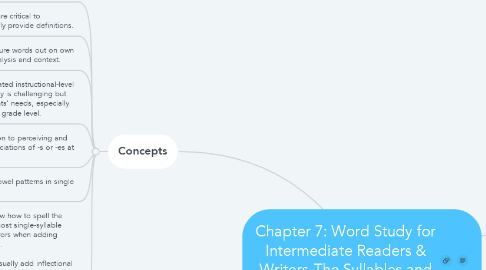Chapter 7: Word Study for Intermediate Readers & Writers-The Syllables and Affixes Stage
by William Alpers

1. Concepts
1.1. Introduce and develop these at the beginning of the unit and before the reading, as well as during and after.
1.2. Mention words that are critical to subject/unit and briefly provide definitions.
1.3. Allow students to figure words out on own using morphemic analysis and context.
1.4. Organziing differentiated instructional-level groups for word study is challenging but will best serve students' needs, especially those who are below grade level.
1.5. Giving explicit attention to perceiving and producing the pronunciations of -s or -es at the end of a word.
1.6. Know how to spell vowel patterns in single syllable words.
1.7. Early- Students know how to spell the vowel patterns in most single-syllable words but make errors when adding inflectional endings. Middle- Students usually add inflectional endings correctly but make mistakes with syllable junctures within words and with unaccented final syllables. Late- Students can spell most words correctly in the syllables and affixes categories on the inventory.
2. Examples/Application
2.1. Activating prior knowledge by introducing a word that they already know, to explore their understanding of new words. EX. solar/solar system/solar eclipse/solar heat.
2.2. Inflection sorts based on open closed syllable sounds.
2.3. Semantic Maps
2.4. Prefix/Suffix Board Games
2.5. Prefix Spin
3. Vocabulary
3.1. Affixes- include prefixes and suffixes which affect meaning of base word.
3.2. Orthography- Understanding of English writing system.
3.3. Intermediate reading stage- Students who are not yet mature or advanced readers. 3rd grade to 8th grade level readers.
3.4. Consolidated Alphabetic Phase- Readers use larger chunks to decode, spell, and store words in memory.
3.5. Morphemic analysis- A powerful tool for vocabulary development and figuring out unfamiliar words during reading.
3.6. Domain Specific academic vocabulary- used in disciplinary studies and includes specialized vocabulary that has a specific meaning, like the term square root in mathematics or perpendicular in geometry.


